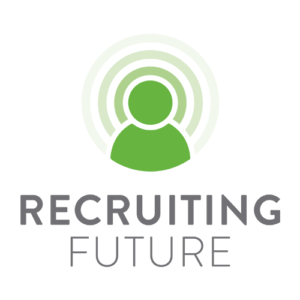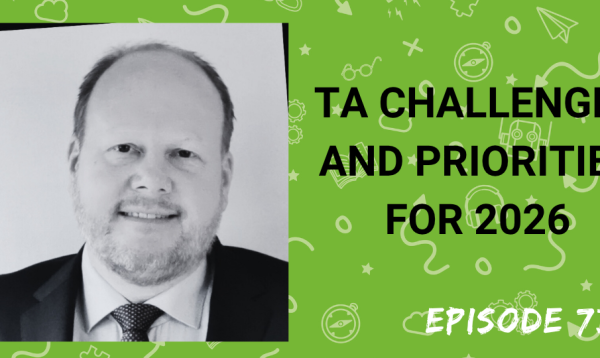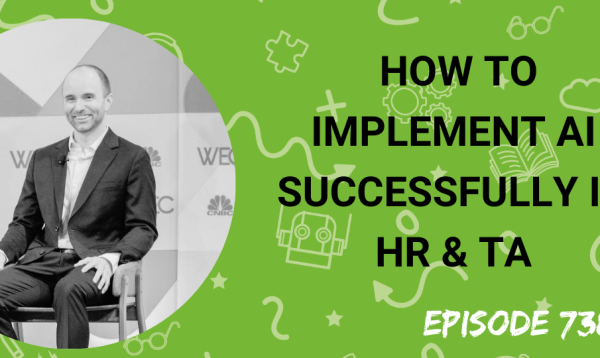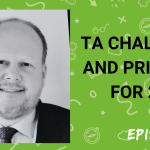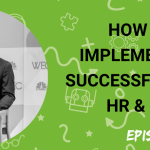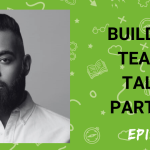Hiring, retention and development strategies for digital talent are big news at the moment as many employers are struggling to get the skills they need into their business.
Unsurprisingly Digital Transformation and its implications for talent was a big theme at the UNLEASH event held in London last month. While I was there, I was lucky enough to speak to two of the excellent speakers about their experiences of driving digital transformation and finding and developing digital talent for their organizations.
First up is Sebastian Kolberg the VP Change Management for Digital Transformation at Bayer. Sebastian shares some fascinating insights into the reality of driving digital transformation in a large and diverse organization.
Topics discussed include:
- Bayer’s Digital Transformation challenges
- The importance of a compelling story
- Digital talent strategies
- The benefits of small experiments
My second interview is with Angelika Inglsperger Group Head Talent Acquisition and Talent Management at Allianz. In our conversation, we discuss the details of some of the tactics Allianz is using to acquire and retain digital talent
Topics discussed include:
- Using Google Assistant as a recruitment marketing voice interface
- Peer to peer employer branding for digital talent
- Using problem-solving to get attention
- Solving the challenges of retaining digital talent
Subscribe to this podcast in Apple Podcasts
Transcript:
Matt Alder [00:00:00]:
Support for this podcast comes from Greenhouse Software. In June, Greenhouse are running Greenhouse Open 2019 in New York, a forum for recruiting and business professionals to come together to dive deeper into the transformative impact of great hiring. This year they’re celebrating the talent makers, the people who have figured out how great hiring drives business growth. The panels, case study sessions and interactive workshops will open new perspectives and hands on experience on the most important talent topics. To learn more about Greenhouse Open and To register, visit greenhouseopen.com and enter the code futurepod for 25% off your ticket. That’s greenhouseopen.com and the 25% off code is futurepod, all in capital letters.
Matt Alder [00:01:10]:
Hi everyone, this is Matt Alder. Welcome to episode 179 of the Recruiting Future podcast. Hiring, retention and development strategies for digital talent are big news at the moment as many employers are struggling to get the skills they need into their businesses. Unsurprisingly, digital transformation and its implications for talent was a big theme at the recent Unleash event held in London last month. While I was there, I was lucky enough to speak to two of the excellent speakers about their experiences of driving digital transformation and finding and developing digital talent for their organizations. First up is Sebastian Kolberg, the VP Change Management for Digital Transformation at Bayer. Sebastian shares some fascinating insights into the reality of driving digital transformation in a large and diverse organization.
Sebastian Kolberg [00:02:06]:
Hello, my name is Sebastian Kolberg. I’m working for Bayer, heading up the change management piece of our digital transformation journey.
Matt Alder [00:02:13]:
Fantastic. So could you tell us a little bit about what the digital transformation journey entails and perhaps some of the challenges that might be unique to your business in terms of what you’re trying to do with digital transformation?
Sebastian Kolberg [00:02:27]:
So basically what we recognize is that digitalization really changes everything. So it changes society, changes private lives, and it now also changes our company. The first and most important step was to really define on what is our strategy. And basically we have a business strategy that has a lot of digital components and to create a compelling story for our people, we reduced it in a very simple concept to say we’re heading into three directions. One is about digitizing customer experience. The second one is about digitizing operations. And the third one is about new digital business models or digitally enabled business models that help us to fulfill our purpose and vision to feed an ever growing population in the world and further foster digital health.
Matt Alder [00:03:13]:
So thinking sort of specifically around the Talent in the business or the talent you’re trying to get into the business? What part has that played in your thinking around digital transformation? Is it about retraining people, hiring people, and putting across a different vision of the company to kind of get the right skills and talent into the. Into the business? What sort of been the effect of.
Sebastian Kolberg [00:03:31]:
So actually, I guess when I look into our organization, we have great talent in all different spaces. One of the complexity drivers is for sure the ever changing customer experiences, ever changing customer demands, and the technology that’s changing that for sure brings us into a position where this topic of embracing lifelong learning and really developing people even further becomes critically important. So that’s one of those things that we have now started to really systematically build up learning and experience journeys where people can learn about the latest technology, learning about new business models, and at the same time to create experiences by for example, using our innovation agenda, where people can start experiments with a new technology because it’s often so new that it’s sometimes uncertain about what the outcome is. So gaining those experiences and learning from failures, talking about that and then make the other next important step is quite important for our people. And for sure it changes the talents landscape in a way that there are lots of new skills and capabilities required, which on one hand means you can develop people and on the other hand you also need to really look outside on where there are those people who can truly make a difference to add on to the existing skilled workforce.
Matt Alder [00:04:49]:
How far are you into the process currently and what have you learned so far?
Sebastian Kolberg [00:04:55]:
I think we’re on a speedy and iterative journey. We’re so far in the process that we have a very clearly defined strategy that’s executed and iteratively shaped. But I think at the same time it’s also about there is not a five to ten year strategy that you revamp every two or three years, but it’s much more fluent to execute this and driving this kind of culture piece and awareness piece that people get to know what does it mean, why the change is a new constant? This is an ongoing challenge from an ambidexterity perspective in regards on one hand, pushing to get the current business and really make it successful and at the same time also focus to develop completely new things. And this remains a challenge on the way forward.
Matt Alder [00:05:44]:
And what surprised you the most from the sort of journey so far, so.
Sebastian Kolberg [00:05:50]:
What is not really a surprise, but at the same time it is, is that we have so many great people all around the world in all the different geographies all the different functions who are just curious to make an impact, who start those small experiments and making them visible and get to know what is already out there, is quite exciting so far. So it’s really finding this kind of balance on what is the strategic things that we really need to get done. And on the other hand, leveraging all the creativity and inspiration. And when we’ve just launched our Digital Innovation Award, it was just amazing to see how many people in all the different functions have great ideas that they’ve started to work on, experimented with an already created business value, where it’s now the question of how can we leverage that and how can we scale all those great ideas.
Matt Alder [00:06:38]:
Fantastic. And you’ve been talking at the event about your experiences and your thoughts around digital transformation. How would you sort of summarise your advice for another business sort of looking at this process? What would your advice be to drive digital transformation forward?
Sebastian Kolberg [00:06:56]:
Basically, I guess it’s about three things. First is about clearly articulate the strategy, create awareness and engagement around that one. Secondly, create an environment where leaders engage with their people and give them room and freedom and trust to collaborate, empower them, accept failure as part of the learning process. And certainly it’s about, I think the cultural piece is the most important one. Digital transformation is for us, a true business transformation. But the business transformation strategy execution is done by people and nowadays it’s really about having the customer in the focus. It’s about collaborate, cross divisional, cross functional in a completely different way than we used to work and challenge the status quo. And I think this is really the topic where the leaders are in the driver’s seat to create this environment for the employees to make a difference.
Matt Alder [00:07:48]:
The final question, I suppose, going right back to the beginning, how do you.
Matt Alder [00:07:52]:
Start a process like this?
Matt Alder [00:07:54]:
How do you get digital transformation started?
Sebastian Kolberg [00:07:56]:
I think most important is to start from the end, which means from the customers. So what is really the problem that you want to solve and then apply digital technology and new collaboration formats, a new working method to solve those problems in a completely different way and creating new solutions instead of just starting with a new technology solution.
Matt Alder [00:08:15]:
My second interview is with Angelika Ingelsberger, group head, Talent Acquisition and Talent Management for Allianz. In our conversation we discuss the details of some of the tactics Allianz is using to acquire and retain digital talent.
Angelika Inglsperger [00:08:32]:
So, hello, my name is Angelica Engelsberger and I’m the group head of talent acquisition and Talent management at Allianz Financial services company based in Munich and with a very decentralized business model with 65 operating entities. I’m responsible there for the whole value chain, employer branding, recruiting and talent management to develop the talent within the organization.
Matt Alder [00:08:56]:
Fantastic. So could you tell us a little bit about the kind of recruitment challenges that you have?
Angelika Inglsperger [00:09:02]:
Yeah, the challenge is as I said, you know, we are very decentralized companies. So we have different entities and they’re using different local systems and they are also using different career websites. So the Internet is global and it’s all about global channels. LinkedIn, Twitter, Facebook and also we wanted to have one global career website. So we started a project last year to consolidate all these 41 local career websites into one what we call the Allianz career website. And there we also want to really offer some value adding services for our applicants. And that’s why we launched the Google Voice Assistant because we saw a trend that the voice assistants, what you have in your daily consumer life with Alexa, Siri, whatever you call it becomes more and more prominent and we wanted to be the first mover to put that into HR services. So what it is about the Google Voice is it sits on our OneAllianz career website and whenever you apply you get a notification in our global E recruiting system say look, here’s the Google Voice. And you can say hey, I want to talk to Allianz careers. And then you can ask some questions about Allianz facts and figures. You can ask about our recruiting process or you can get prepared for the interview if you want.
Matt Alder [00:10:16]:
Can you sort of tell us about the types of talent that you’re recruiting and how this approach has kind of helped to do that?
Angelika Inglsperger [00:10:24]:
Yes. So as our company we are competing for the same talent. We are recruiting digital talent and there we are not only competing with insurance companies, we are competing with the world. So I think every company is looking for the top 10 profiles like data scientist, IT security, UX designer, IT developer. And here we also have a challenge on the Google Voice so people can solve a problem, an issue they’re having in their daily life. And it’s first not linked to alliance. It’s more, you know, how would you solve this IT issue or this IT challenge? And then you say oh you like solving issues. Have you ever thought about Allianz as an employer come to us. So we’re currently testing that. But this is something where how we want to attract digital talent because we found out they want to talk to other digital talent and they want to solve problems and issues and they’re not so much interested in companies. So this is something we are doing to attract them.
Matt Alder [00:11:19]:
Could you tell us a little bit more about how that works, how that works in practice? How do you kind of reach out to them? How do they sort of get on the platform to be able to do that?
Angelika Inglsperger [00:11:27]:
Yeah, as I said, you know, we are currently testing this challenge on guys, but we also have another topic, what we call how does it videos. We are just close to Launch that on YouTube channel. Here again, we have videos where, for example, a data scientist is solving a challenge, a mathematical thing, something. And then at the end we link it to Allianz. So we try to get the people, you know, on other platforms, YouTube or StakeOverflow or GitHub, and we try to show people which are the same. So data scientists or UX designer, IT developer, let them solve their daily challenges and then come to Allianz. This is a new format we are currently testing.
Matt Alder [00:12:05]:
Presumably this is also ties into the kind of employer brand you’ll be building to attract that kind of talent. What sort of challenges have you sort of faced from an employer brand perspective in terms of reaching out to people like data scientists and showing you that, showing them that you’re a great place for them to sort of continue their careers?
Angelika Inglsperger [00:12:25]:
Yeah, I mean, you know, Allianz is not the top number one employer of choice when it comes to digital talent. They don’t have us on the radar and, you know, there’s a lot to do. We are not Google yet, but what we say in our employer value proposition, we say Allianz is the home for those who dare. So home means, you know, a caring and really friendly environment with a lot of heritage and values. And daring means, you know, people should have the courage to try out new things. And we need a lot of people who are daring to build something, to do something through something new. So we say people daring to grow, daring to develop, because Allianz is not there yet. So you have a lot to build. And I think that’s different, you know, compared to other companies where everything is already set in stone. They can do a lot, but they have to have us on the radar. So the challenge for us is, you know, not only to attract the talent, but also to retain them. That’s an even bigger challenge. And of course we see that there are different ways to retain them because they have different needs. But it’s very important for us to develop the people within. And we always say, you know, there’s not only the way up to develop people because we only have one CEO position and not everyone can get it or one CTO position. So that’s why we say they are to grow. And development means also in current role. It means on the job development. So for example, we have established a format called job swaps. So that means put yourself in the shoes of another and then you find out, you know. So for example, if we would change jobs, what would it mean? You know, would do your job for three months and you would do my job and afterwards you would think completely different about each other and this would really drive also collaboration and gives us a new way of thinking. This is something definitely what we do. What we also do is we want to move people internally. And as I said, we are very decentralized. So sometimes we do not have the transparency where all these job posting are. So we have established a format called internal headhunters. We call them talent brokers or matchmakers and they try to bring candidates and open positions or candidates and open projects or swaps together. And this is how we can move to people across different functions, across different operating entities, and also of course, across different countries.
Matt Alder [00:14:41]:
My thanks to Sebastian and Angelika and of course to the team at Unleash for helping to set up those interviews. You can subscribe to this podcast in Apple Podcasts or via your podcasting app of choice. The show also has its own dedicated app, which you can find by searching for recruiting Future in your App Store. If you’re a Spotify user, you can also find the show there. You can find all the past episodes@www.rfpodcast.com on that site, you can subscribe to the mailing list or find out more about Working with me. Thanks very much for listening. I’ll be back next week and I hope you’ll join.


